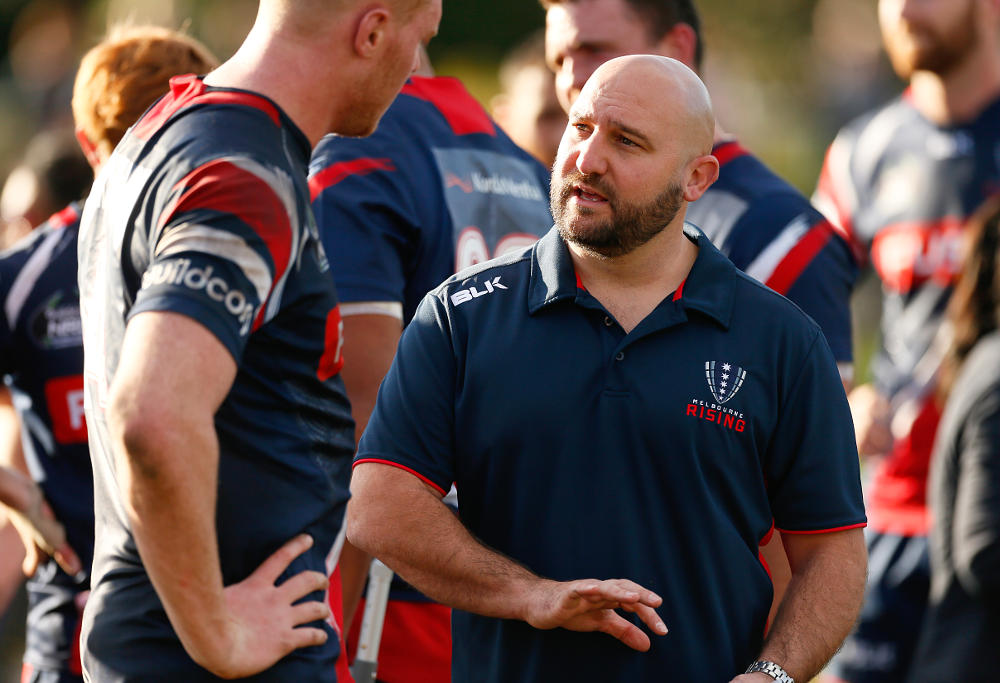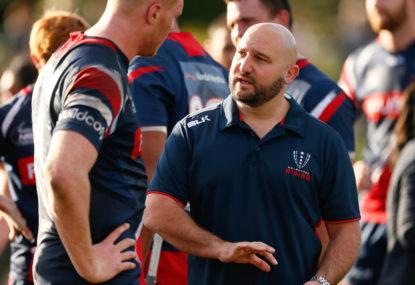Ahead of the weekend’s NRC semi-finals there is almost unanimous agreement from stakeholders and fans that the 2016 version is fulfilling major stated objectives.
One of these is to provide a pathway for promising players from club rugby through to Super Rugby and, eventually for some, the Wallabies.
It remains to be seen how many players secure regular starting spots, but with improved integration in the back offices, and Super Rugby and NRC coaches working closely together – not to mention the performance of many players – it appears that things are on the right track.
But while the public spotlight is on star turns like Irae Simone, Izaiah Perese, Tyrone Viiga, Jack Dempsey, Lukhan Tui and others, the NRC is also providing fertile ground for coaches to make their mark as well.
Leading into a tough away semi-final in Newcastle, against ‘minor premier’ NSW Country, Melbourne Rising coach Zane Hilton is delighted at how the competition is developing, excited by his own role in it, and eager to chat about what the NRC means for a young, ambitious coach.
Hilton has packed a lot of coaching experience into his relatively short career; a Queensland development role, stints in Italy, Brisbane and Japan before settling into the Melbourne café culture, assisting Tony McGahan with the Rebels, and as the head coach of the Rising.
It is clear that he relishes his relationship with McGahan and has found the perfect balance where, “I have the freedom to coach the way I want to coach, have my own stamp on things, while at the same time upholding the same values we have at the Rebels.”
So while McGahan has no direct, week-to-week involvement with the Rising, he and Hilton remain in constant contact, with an eye to maintaining the same style of play throughout the organisation, and managing the workload of players who have come through a long year, starting with Super Rugby.
As Hilton explains, “for these guys the focus is on freshening the players up, providing a different stimulus and a constant learning environment, as opposed to flogging them on the training track.”
By contrast, the needs of players coming into the NRC from club rugby are quite different; “these guys need a different type of stimulus, a higher base and more hard work”, he adds. All part of a day’s work in developing promising club players into true rugby professionals.
What is also interesting about playing styles is that, perhaps because of the laws and the points scoring system, all of the sides seem to be playing a similar game. Indeed, Hilton acknowledges that “the NRC is a different beast, it really is a stand-alone game.” He admits that sometimes it can feel a little bit like touch rugby, but is adamant that the fabric of the game hasn’t been lost at all, citing the Western Sydney Rams, who have built a lot of their play around a strong maul, and the number of tries scored this year directly from both lineouts and scrums.
In terms of developing players for higher levels, while the nature of the rugby in the NRC doesn’t tick all Super Rugby boxes, there are big plusses in terms of developing attacking skills, coping with unstructured play and rapid adjustment to turnovers in attack and defence. And with the ball in play for longer periods, increased demands are being placed on all players on executing skills under fatigue.
Another area Hilton pinpoints as a winner for the NRC is the improvement in tight-five play; partly as a result of dropping a team this year and distilling the better players into fewer places, but also because of coaches recognising the need for strong set pieces. If the deterioration of forward play was a fear of many pundits heading into the NRC, it is fair to say that these concerns have proven unfounded.
One thing that shines through in our discussion is the collegiality that exists between the coaches. It is as if they all share a place in Australia’s rugby history and, while they all want to be the one guy who wins the competition, there exists a strong bond and understanding that they are all contributing to the development and betterment of Australian rugby.
Hilton points out that the coaching fraternity comes from a wide range of backgrounds, and is not just a conveyor belt for recently retired players. For example, Brisbane’s Rob Seib comes from club rugby, Sydney Rays coach Simon Cron was the 2015 Shute Shield ‘coach of the year’, and the Western Sydney Rams provides a first opportunity as head coach for the widely respected John Muggleton.

With high profile ex-players like Toutai Kefu and Jeremy Paul also prominent, it is clear that the NRC is developing a pool of talented and committed coaches, exposing them to a high level of competition, and broadening the available talent for future Super Rugby appointments; which is exactly as it should be.
The conversation turns to the 2016 season itself, and who from the Rising has made strides forward this year. Hilton doesn’t hesitate to single out his captain Tom English, their “spiritual leader on and off the field”, who has shown consistent ability to beat players, offload and who is back to top pace. Nic Stirzaker is also lauded for his support and leadership, despite struggling to get onto the field for long periods, due to injury.
Ben Meehan, before his injury, impressed in the number ten jersey, his versatility potentially providing the Rebels with more bench options in next year’s Super Rugby. Of the newer players coming through the Dewar Shield, No. 8 Harley Fox is praised as “the Thomas Waldrom of Australian rugby”, his raw frame not as hard edged as some of the running forwards of Pacific Islands heritage, but his talent and work ethic catching the eye.
Interestingly, three of the four players mentioned are either out of the frame or doubtful for the semi-final, due to injury. Throw in a number of others suffering from various injuries, players like Jack Debreczini, Steve Cummins and Rob Leota, and Hilton knows he has a huge task ahead of him to pull together a competitive team to travel to Newcastle and defeat NSW Country.
The news that Ned Hannigan might be missing for Country due to a shoulder injury, helps square the ledger a little, and perks Hilton up. Not that he is daunted by the task; pointing out that the Rising is the only team which has played in all three finals series and that he still has plenty of experienced players at his disposal.
He relishes the opportunity to start again, all square with the opposition; “it’s a different in finals, all we have to do is win, no bonus points or distractions.” He is particularly keen for the Rising, off two straight losses, to get back to playing the way they want, applying pressure while limiting their own mistakes, but at the same time having the confidence to use the ball, because, as anyone who has watched the NRC knows, “you have to score tries to win these games.”
It’s an interesting position for the sharp and impressive Hilton to be in, one of four coaches left with a chance to win the NRC. So much of the emphasis for this competition is around player development, and providing direct benefits to the Super Rugby franchises; which the coaches buy into and are happy and proud to contribute to.
But as much as any of the coaches, Hilton would love to have an NRC title on his CV. The NRC pathway objective is not for players alone, and whichever coach walks away with this year’s’ title will be doing his own career no harm at all.






























































































